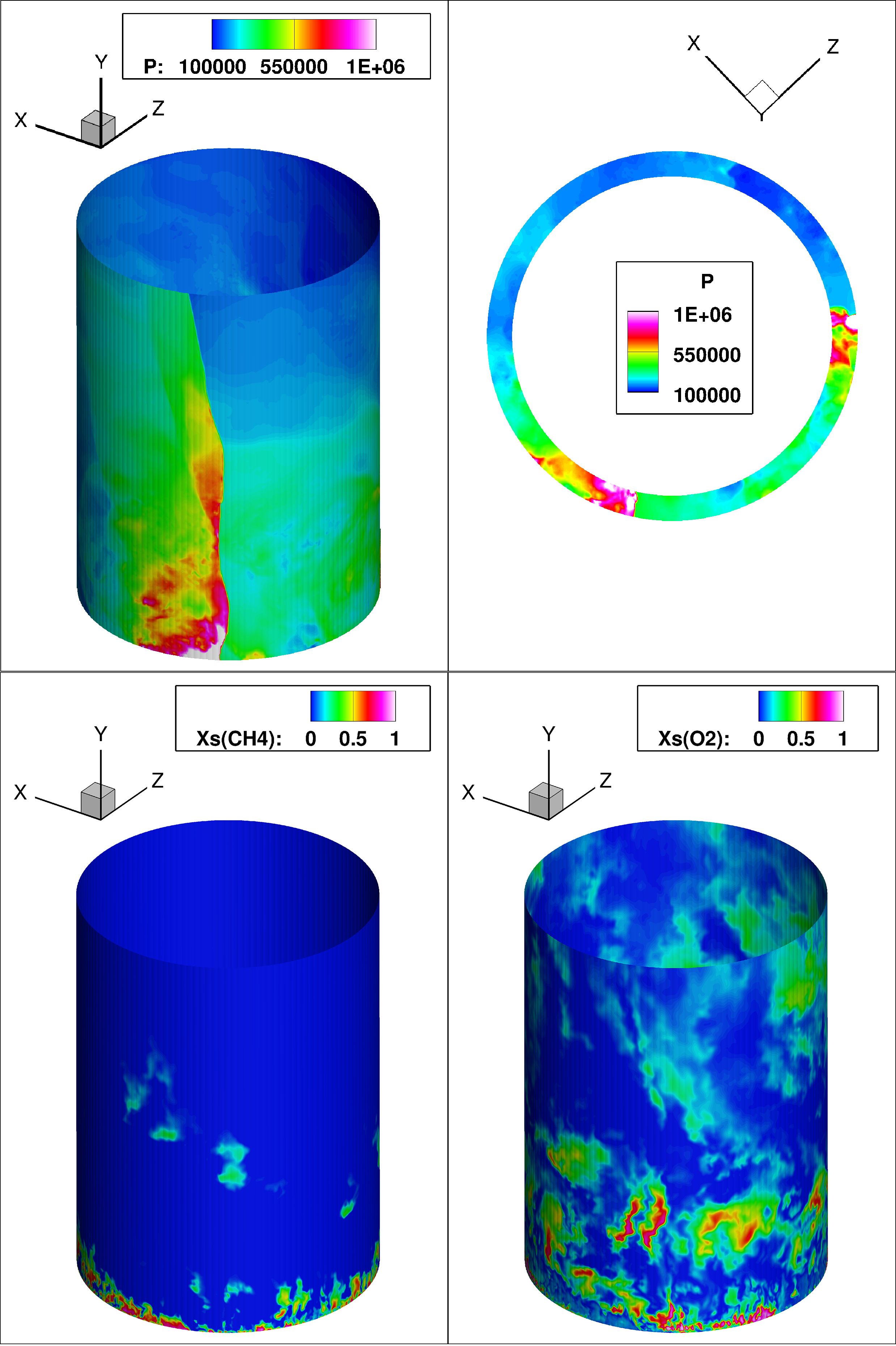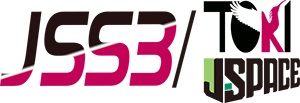Investigation on the structure of rotating detonation wave
JAXA Supercomputer System Annual Report April 2019-March 2020
Report Number: R19ECMP12
Subject Category: Competitive Funding
- Responsible Representative: Shingo Matsuyama, Aeronautical Technology Directorate, Numerical Simulation Research Unit
- Contact Information: Shingo Matsuyama(smatsu@chofu.jaxa.jp)
- Members: Shingo Matsuyama
Abstract
In this study, combustion analysis by large eddy simulation (Large-Eddy Simulation, LES) was carried out in order to clarify propagation characteristics and detailed structure of rotating detonation wave. Two-dimensional and three-dimensional simulations were carried out for stable operating conditions in the combustion test of the rotating detonation combustor conducted at the Kakuda Space Center from the equivalence ratio of 0.6 to 1.6 to reproduce the rotating detonation wave propagating in the combustor.
This work was supported by Innovative Science and Technology Initiative for Security Grant Number JPJ004596, ATLA, Japan.
Reference URL
N/A
Reasons and benefits of using JAXA Supercomputer System
To perform a combustion LES considering more than 20 chemical species generated by the combustion of methane fuel is very expensive, so that it is impossible to carry out it on usual workstations. In addition, the use of a supercomputer is indispensable in order to execute a large number of parametric analyses for a plurality of injection conditions in a realistic computing time.
Achievements of the Year
LES of non-premixed rotating detonation of CH4 and O2 was carried out assuming an annular combustor with 101 mm diameter. It was shown that the propagation velocity of the rotating detonation wave obtained by two dimensional (Fig. 1) and three dimensional (Fig. 2) LES with the equivalence ratio of 0.6 to 1.6 was about 70% against the Chapman-Jouguet velocity. The propagation velocity obtained by the simulation was slightly higher than that obtained by the combustion test, but the approximate tendency was successfully reproduced.

Fig.1: Instantaneous contours of (a) temperature, (b) pressure, and mole fractions of (c) CH4 and (d) O2 by the two-dimensional LES at ER = 1.0.

Fig.2: Instantaneous contours of pressure (upper) and mole fractions of CH4 and O2 (lower) at t = 1.0 ms by the three-dimensional LES at ER = 1.0.
Publications
– Non peer-reviewed papers
1) Shingo Matsuyama, Kazuya Iwata, Makoto Kojima, Yoshio Nunome, Hideyuki Tanno, Hideto Kawashima, and Toshiharu Mizukaki, “Combustion Simulation of Rotating Detonation with a Non-premixed CH4/O2 Injection”, Proceedings of the 57th Symposium (Japanese) on Combustion, B215,.2019.
2) Shingo Matsuyama, Kazuya Iwata, Yoshio Nunome, Hideyuki Tanno, Toshiharu Mizukaki, Makoto Kojima, and Hideto Kawashima, “Large-Eddy Simulation of Rotating Detonation with a Non-premixed CH4/O2 Injection”, AIAA Paper 2020-1174, 2020.
3) Shingo Matsuyama, Kazuya Iwata, Makoto Kojima, Yoshio Nunome, Hideyuki Tanno, Hideto Kawashima, and Toshiharu Mizukaki, “LES of Rotating Detonation with a Non-premixed CH4/O2 Injection”, Proceedings of the Symposium on Shock Waves in Japan, 1C1-2, 2020.
4) Kazuya Iwata, Shingo Matsuyama, Makoto Kojima, Yoshio Nunome, Hideto Kawashima, Hideyuki Tanno, and Toshiharu Mizukaki,”Research Progress at JAXA on Fundamental Understanding of Wave Dynamics and Performance Evaluation of Rotating Detonation Rocket Engine”, Journal of the Combustion Society of Japan, Vol.62 Issue 200, 2020.
– Oral Presentations
1) Shingo Matsuyama, Kazuya Iwata, Makoto Kojima, Yoshio Nunome, Hideyuki Tanno, Hideto Kawashima, and Toshiharu Mizukaki, “Combustion Simulation of Rotating Detonation with a Non-premixed CH4/O2 Injection”, the 57th Symposium (Japanese) on Combustion,.2019.
2) Shingo Matsuyama, Kazuya Iwata, Yoshio Nunome, Hideyuki Tanno, Toshiharu Mizukaki, Makoto Kojima, and Hideto Kawashima, “Large-Eddy Simulation of Rotating Detonation with a Non-premixed CH4/O2 Injection”, AIAA Scitech 2020 Forum, 2020.
Usage of JSS2
Computational Information
- Process Parallelization Methods: MPI
- Thread Parallelization Methods: OpenMP
- Number of Processes: 220 – 1920
- Elapsed Time per Case: 360 Hour(s)
Resources Used
Fraction of Usage in Total Resources*1(%): 0.00
Details
Please refer to System Configuration of JSS2 for the system configuration and major specifications of JSS2.
| System Name | Amount of Core Time(core x hours) | Fraction of Usage*2(%) |
|---|---|---|
| SORA-MA | 0.00 | 0.00 |
| SORA-PP | 2.49 | 0.00 |
| SORA-LM | 0.00 | 0.00 |
| SORA-TPP | 0.00 | 0.00 |
| File System Name | Storage Assigned(GiB) | Fraction of Usage*2(%) |
|---|---|---|
| /home | 342.25 | 0.29 |
| /data | 1,628.02 | 0.03 |
| /ltmp | 279.02 | 0.02 |
| Archiver Name | Storage Used(TiB) | Fraction of Usage*2(%) |
|---|---|---|
| J-SPACE | 0.00 | 0.00 |
*1: Fraction of Usage in Total Resources: Weighted average of three resource types (Computing, File System, and Archiver).
*2: Fraction of Usage:Percentage of usage relative to each resource used in one year.
JAXA Supercomputer System Annual Report April 2019-March 2020


